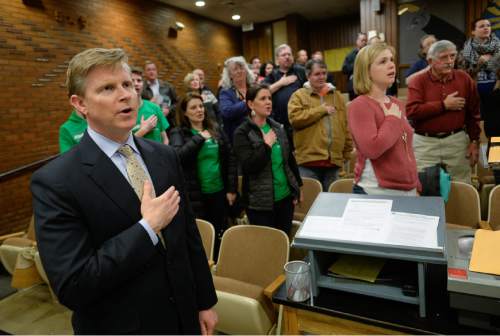This is an archived article that was published on sltrib.com in 2016, and information in the article may be outdated. It is provided only for personal research purposes and may not be reprinted.
Is anyone else noticing that, in the midst of arguing in court that it has the superior process for choosing candidates, the Utah Republican Party is showing an inferior process for choosing candidates?
And to hear the explanation from party leaders, it can be summed up as "too much participation." Specifically, the party did not anticipate or manage well the heavy turnout it received in its recent caucuses. That included an attempt at online voting in which a quarter of voters were rejected and some chaotic meetings that overwhelmed caucus organizers when more than 150,000 people showed up. (Democrats, who were similarly overwhelmed, had argued for state-run presidential primaries instead of the caucuses, but the GOP-led Legislature refused to fund it.)
Now we can add the fact that, less three weeks from the county conventions, the Utah GOP still can't produce reliable lists of the delegates who will be choosing candidates at those conventions. Coping with a variety of record keeping at the caucuses, party leaders are still scrambling to get the information into a data base. The better organized campaigns have taken to working the phones and building their own lists of delegates instead of waiting for the party.
The result is that the powerful GOP delegates who essentially choose Utah's leaders will be a little less informed this year because candidates have less time to reach out to them — not that being informed is necessarily that valuable to anyone who has witnessed the horse trading and backstabbing that happens at state and county conventions.
And all of this is happening against the backdrop of the state GOP's two-year legal battle to prevent more public participation in its election process. In 2014 the party sued the state over Senate Bill 54, which allows candidates to bypass the conventions and get on the primary election ballot by gathering signatures from voters. Party leaders insist that the state-funded primary should be theirs alone to control, and they refuse to accept that signature gatherers should be allowed on the ballot.
The latest issue in the suit involves the number of signatures that candidates are required to gather, which the party argues is too high in some legislative districts. (Yes. The party is arguing that too many signatures would be required in some districts at the same time it's arguing that no amount of signatures should be considered enough. The party also rejected a way to make it easier for candidates to get enough signatures: allowing thousands of unaffiliated voters to sign.)
That attitude explains why the party stumbled during this spring surge in participation. Encouraging democracy is not really a priority these days.



